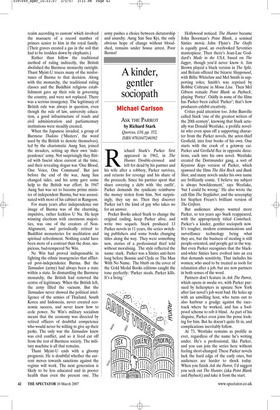A kinder, gentler sociopath
Michael Carlson
ASK THE PARROT by Richard Stark Quercus, £10, pp. 352, ISBN 9781847240392 Richard Stark’s Parker first appeared in 1962, in The Hunter. Double-crossed and left for dead by his partner and his wife after a robbery, Parker survives, and returns for revenge and his share of the proceeds. Since his partner spent that share covering a debt with ‘the outfit’, Parker demands the syndicate reimburse the money stolen from him. Not surprisingly, they say no. Then they discover Parker isn’t the kind of guy who takes no for an answer.
Pocket Books asked Stark to change the original ending, keep Parker alive, and write two sequels. Stark produced 13 Parker novels in 11 years, the series switching publishers and some books changing titles along the way. They were something new, stories of a professional thief told without moralising. The style reflected the name: stark. Parker was a Sixties anti-hero long before Bonnie and Clyde or The Man With No Name. The blurb on the cover of the Gold Medal Books editions caught the tone perfectly: ‘Parker steals. Parker kills. It’s a living.’ Hollywood noticed. The Hunter became John Boorman’s Point Blank, a seminal Sixties movie. John Flynn’s The Outfit is equally good, an overlooked Seventies masterpiece. Then there’s Jean-Luc Goddard’s Made in the USA, based on The Jugger, though you’d never know it. Jim Brown played a black version in The Split, and Britain offered the bizarre Slayground, with Billie Whitelaw and Mel Smith in supporting roles; Smith’s was reprised by Robbie Coltrane in Mona Lisa. Then Mel Gibson remade Point Blank as Payback, playing ‘Porter’. Oddly in none of the films has Parker been called ‘Parker’; that’s how producers exhibit creativity.
Critics paid attention too. John Banville called Stark ‘one of the greatest writers of the 20th century’, knowing that Stark actually was Donald Westlake, a prolific novelist who even spun off a supporting character from the Parker novels, the actor-thief Grofield, into four books of his own. One starts with the crash of a getaway car. Parker and Grofield flee in opposite directions, each into his own novel. Westlake created the Dortmunder gang, a sort of Keystone Kops version of Parker, which spawned the films The Hot Rock and Bank Shot, and many novels under his own name are brilliantly comic. ‘I believe my subject is always bewilderment,’ says Westlake, ‘but I could be wrong.’ He also wrote the cult film The Stepfather, and the screenplay for Stephen Frears’s brilliant version of The Grifters.
But audiences always wanted more Parker, so ten years ago Stark reappeared, with the appropriately titled Comeback. Parker’s a kinder, gentler sociopath now. It’s tougher, modern communications and surveillance technology being what they are, but the business of stealing is still people-oriented, and people get in the way. But even Parker recognises that the blackand-white Sixties have evolved into an era that demands sensitivity. That includes his women, who used to be treated as tools for relaxation after a job, but are now partners in both senses of the word.
Partners don’t feature in Ask The Parrot, which opens in media res, with Parker pursued by helicopters in upstate New York after last novel’s job went bad. He holes up with an unwilling host, who turns out to also harbour a grudge against the racetrack where he worked, and has a foolproof scheme to rob it blind. As part of his disguise, Parker even joins the posse looking for him. But he doesn’t quite fit in, and complications inevitably follow.
At 73, Westlake remains as prolific as ever, regardless of the name he’s writing under. He’s a professional, like Parker, and you can join the series here without feeling short-changed. These Parker novels lack the hard edge of the early ones, but audiences are harder to shock today. When you finish Ask the Parrot, I’d suggest you seek out The Hunter, (aka Point Blank and Payback) and take it from the start.


























































































 Previous page
Previous page